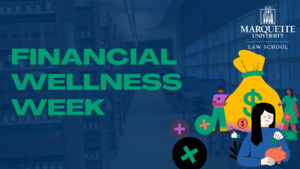One Final Glimpse into the Law School Office of Student Affairs
This is the tenth and final post in a weekly series about the work of Marquette Law School’s Office of Student Affairs. Previous posts can be accessed here and at the bottom of the post linked here.
If you do your job well in student affairs, a former colleague once told me, it’s possible that no one will know precisely what you do. The same is likely true across many different departments in many different fields. In this context, it reflects that a lot of our work in student affairs is “behind-the-scenes”—putting together a schedule, organizing important programs, making the trains run on time. This may also mean that a lot of what we do is not especially “marketable.” And yet we want students to know enough about what we do that they recognize our availability to them.
So, for better or worse, this series of posts, initiated by the dean, was an effort to lift that veil a bit. In this final entry, I thought I would take one more crack at it, so that, just like the literal door to our office (in suite 238), the metaphorical door to our office is propped wide open.
On a regular basis, the five members of the Office of Student Affairs gather to discuss upcoming projects on each of our plates. We also, in true summer-camp fashion, go around the table, each of us sharing a highlight and a low point from the prior month or so. Whether you call it “rose, thorn, and bud,” “peach and pit,” or just regular old “high/low,” it’s a chance to reflect on our challenges and celebrate our wins. Here’s a little sampling.
Let’s start with a “rose.” There was the opportunity one of us had recently to attend a graduate’s individual swearing-in ceremony. Few paths to an attorney’s swearing-in are straightforward; they are often marked by challenges, of the academic, professional, and personal variety. Whether as part of the group ceremony following graduation or in an individual ceremony in a small courthouse far from Milwaukee, it’s an occasion for us to celebrate the hard work and dedication of our students.
Then there was the failed email mail merge. The stuff of nightmares really, because this was an email campaign with a tight deadline to be sent to a very large group of individuals. Who could have known that the emails were stuck in some sort of Microsoft purgatory? After a few days, concerned about the nonexistent response rate, we put two and two together. We managed to fix the problem, but not without a healthy dose of stress and frustration first. Sometimes, even if you do everything “right,” things go wrong. It turns out, that’s OK.
We celebrate the cyclical accomplishments—pulling off orientation, registering students for a new semester, getting through another exam period, graduating another class—as much as anything. Each is well-practiced but nevertheless requires an almost obsessive attention to detail, a seemingly endless to-do list, and a constant drive to improve upon the last iteration.
The lowest lows are also the saddest because they don’t involve an event or a task. We keep these intensely private. But we know they’re there, and we work to support our students and each other through these times.
Those lowest lows also put into perspective some other “lows.” Maybe we take an angry call from a community member who is dissatisfied when law school staff could not provide direct legal advice. We do our best to provide resources and referrals with compassion and sincerity and then must accept the outcome.
I’ll conclude (on the positive side of the ledger) with our annual welcoming of a new class. It’s the culmination of the work of student ambassadors, the Law School’s Office of Admissions, our faculty, and—not least—the culture of Marquette University Law School. This “high” has less to do with the contribution of any one team member or office and more to do with the fact that we all hope we are part of something that will allow our students to pursue their goals.
As we wrap up this series, I hope that our work and our team feel a bit more familiar, like people you might turn to if you need a form, want to start a student organization, or are just going through a tough time. And if everything is going fine and you find that you have no idea what happens in the Law School’s Office of Student Affairs but know that you can go there if you need to, we’ll take that as a sign of success. It means we’re doing our job.

